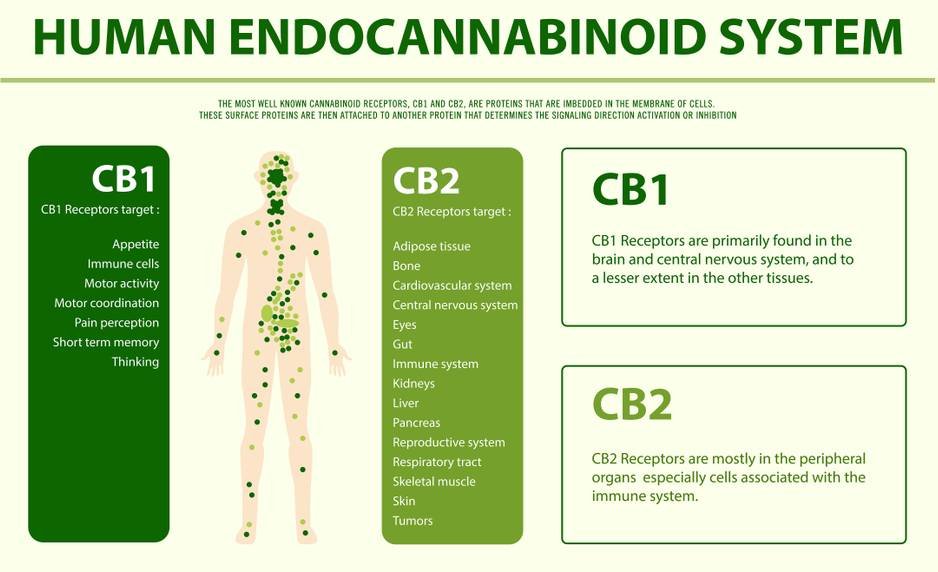The Endocannabinoid System (ECS) is a complex biological system that plays a crucial role in maintaining balance within your body, known as homeostasis. In recent years, the ECS has gained significant attention due to its interaction with cannabinoids like CBD and THC, which results in a wide range of potential therapeutic benefits.
In this article, we will explain the endocannabinoid system in detail, how it functions, and how two prominent compounds CBD (cannabidiol) and THC (tetrahydrocannabinol) interact with this system in your body.
What is the Endocannabinoid System (ECS)?

The ECS, short for the Endocannabinoid System, is a complex cell-signaling system of receptors, enzymes, and endocannabinoids found throughout the body (1).
ECS plays a crucial role in regulating various bodily functions, maintaining homeostasis, and ensuring our overall well-being.
The fundamental purpose of the ECS is to fine-tune a wide array of physiological processes within the body and ensure that they operate within optimal parameters. This includes the regulation of mood, sleep patterns, appetite, immune responses, and pain perception, among other essential functions (2).
The ECS consists of three key components:
Receptors (CB1 and CB2):
The ECS’s foundation lies in its receptors. These receptors are scattered strategically throughout the body, with distinct distributions. CB1 receptors are predominantly located within the central nervous system, including the brain and spinal cord.
Conversely, CB2 receptors are primarily found in peripheral tissues, particularly in immune cells. These receptors are like molecular gatekeepers that respond to signals from endocannabinoids and cannabinoids, initiating various physiological responses.
Endocannabinoids:
The ECS operates on a delicate balance maintained by endogenous compounds known as endocannabinoids. Anandamide and 2-AG (2-arachidonoylglycerol) are two such endocannabinoids produced by the body.
When these endocannabinoids bind to their respective receptors (CB1 and CB2), it sets off a cascade of molecular events that regulate a wide range of bodily functions like pain, inflammation, sleep, and mood.
Enzymes:
Enzymes play a vital role in the ECS by ensuring that endocannabinoids don’t linger in the system longer than needed. Two primary enzymes involved in this process are fatty acid amide hydrolase (FAAH) and monoacylglycerol lipase (MAGL).
These enzymes break down endocannabinoids once they’ve fulfilled their functions, maintaining the precise balance required for optimal ECS performance.
How does ECS work?
The ECS is a dynamic and adaptable system that constantly monitors the body’s internal environment. When something within the body goes out of balance, such as when there’s inflammation or pain in your body or when you can’t sleep after a hard day’s work, a healthy ECS springs into action.
Once ECS detects an imbalance, it releases endocannabinoids to bind with the specific CB receptors, signaling to the body that the necessary adjustments are necessary.
Once endocannabinoids bind to their respective receptors, a series of signaling events is set in motion which results in a range of physiological responses designed to restore balance or homeostasis within the body.
To ensure that the ECS doesn’t overreact or continue signaling indefinitely, it employs a feedback mechanism in the form of enzymes to prevent endocannabinoids from lingering in the system longer than necessary, maintaining a balanced ECS.
What are the functions of the ECS?
The ECS plays a multifunctional role in various physiological processes within your body, which include:
- Pain management: The ECS has a significant influence on the perception of pain. By modulating pain signals, it can provide a natural mechanism for alleviating physical discomfort.
- Inflammation control: ECS has a regulatory function in immune responses, reducing excessive inflammation within the body. This function is essential for maintaining tissue health and preventing chronic inflammation-related conditions.
- Mood and stress regulation: The ECS also influences your mood, anxiety, and stress responses, contributing to overall emotional well-being. This function has sparked interest in the potential of cannabinoids like CBD for managing anxiety and related disorders as it can activate the ECS.
- Appetite and metabolism stimulation: ECS can help control appetite, food intake, and energy balance, impacting weight management.
- Sleep regulation: The ECS also plays a role in the regulation of sleep patterns and managing insomnia, ensuring that you achieve restful and restorative sleep.
- Immune function: By modulating immune responses, the ECS can influence the body’s ability to respond to infections, diseases, and other health challenges.
How does CBD affect the ECS?
Cannabidiol, or CBD, is a non-psychoactive compound found in cannabis and hemp plants, and it interacts with the ECS in a unique manner. Unlike THC, which binds directly to ECS receptors, CBD modulates the ECS indirectly, influencing its signaling and regulatory processes.
CBD acts as a “modulator,” when altering the CB receptors’ activity. By doing so, it helps regulate various physiological functions within the body, such as:
Enhancement of endocannabinoid production:
CBD, being a cannabinoid can increase the levels of endocannabinoids in the body, such as anandamide, in the body. Anandamide is often referred to as the “bliss molecule” due to its role in mood regulation.
By inhibiting the enzymes responsible for breaking down anandamide, CBD allows this endocannabinoid to remain active for extended periods. This, in turn, helps maintain ECS balance and contributes to the regulation of mood, pain, and other functions.
Inhibition of enzymes:
CBD can inhibit the action of enzymes like fatty acid amide hydrolase (FAAH) and monoacylglycerol lipase (MAGL). These enzymes break down endocannabinoids once their functions are complete.
By slowing down this breakdown process, CBD prolongs the presence of endocannabinoids, leading to longer-lasting effects on ECS functions.
Anti-inflammatory and analgesic properties:
CBD’s interaction with the ECS contributes to its anti-inflammatory and analgesic (pain-relieving) properties. By reducing inflammation and modulating pain signaling, CBD offers a natural means of pain management without the psychoactive effects associated with THC.
Anxiolytic effects:
CBD has shown promise in managing anxiety-related disorders. This effect is due to its ability to influence the ECS. By enhancing endocannabinoid signaling and promoting a state of relaxation, CBD can help individuals manage stress and anxiety.
Anti-seizure effects:
CBD’s interaction with the ECS has been particularly notable in the treatment of epilepsy and seizure disorders. Epidiolex, a pharmaceutical-grade CBD product, has been approved by the FDA for managing certain forms of seizures.
It’s important to note that CBD’s influence on the ECS is complex and multifaceted. Research into its exact mechanisms is ongoing, and the full extent of its effects on the ECS is still being explored.
What is clear, however, is that CBD does have the potential to modulate the ECS to promote balance and well-being.
How does CBD affect the ECS?
Tetrahydrocannabinol, or THC, is the psychoactive compound found in cannabis and hemp plants, and it interacts with the Endocannabinoid System (ECS) differently from non-psychoactive cannabinoids like CBD.
Here’s a detailed exploration of how THC affects the ECS:
Activation of CB1 receptors:
THC binds directly to the CB1 receptors, which are primarily located in the central nervous system, including the brain. This binding is the primary reason behind the psychoactive effects of THC, as it leads to altered perception, mood changes, and other cognitive effects.
Euphoria and altered perception:
The direct activation of CB1 receptors by THC also results in the euphoric “high” or altered state of consciousness that is often associated with cannabis use. It can lead to feelings of relaxation, happiness, and altered sensory perception, making it an attractive choice for recreational use.
Appetite stimulation:
One of THC’s notable effects is its ability to stimulate appetite. This property, often referred to as “the munchies,” is linked to the activation of CB1 receptors in the brain’s appetite-regulating regions. THC can increase the enjoyment of food and promote food intake.
Pain relief and anti-inflammatory effects:
While THC’s primary interaction is with CB1 receptors, it also binds to CB2 receptors, which are primarily located in the immune system and peripheral tissues. This interaction leads to pain relief and anti-inflammatory effects, making THC a potentially valuable option for medical conditions that involve pain and inflammation.
In summary, THC’s interaction with the ECS is notable for its direct binding to CB1 receptors, which leads to the characteristic euphoria and altered consciousness. Simultaneously, its interactions with CB2 receptors contribute to its potential pain relief and anti-inflammatory effects.
Final thoughts
The Endocannabinoid System is a remarkable and intricate regulatory system that impacts numerous physiological functions in the human body.
Understanding how CBD and THC affect the ECS is crucial if you are seeking to harness the potential therapeutic benefits of these cannabinoids. As research into this field continues to expand, we can look forward to more insights and applications of the ECS in the realm of health and wellness.
Disclosure:
The information in this article is intended for general use only and may not always be appropriate for everyone’s needs. Your health and wellness are unique to you, so before acting on anything we say, seek personalized advice from a medical professional.
We value the accuracy and editorial integrity of all our articles, and we strive to ensure that the content we publish is accurate and up-to-date to the best of our knowledge.

